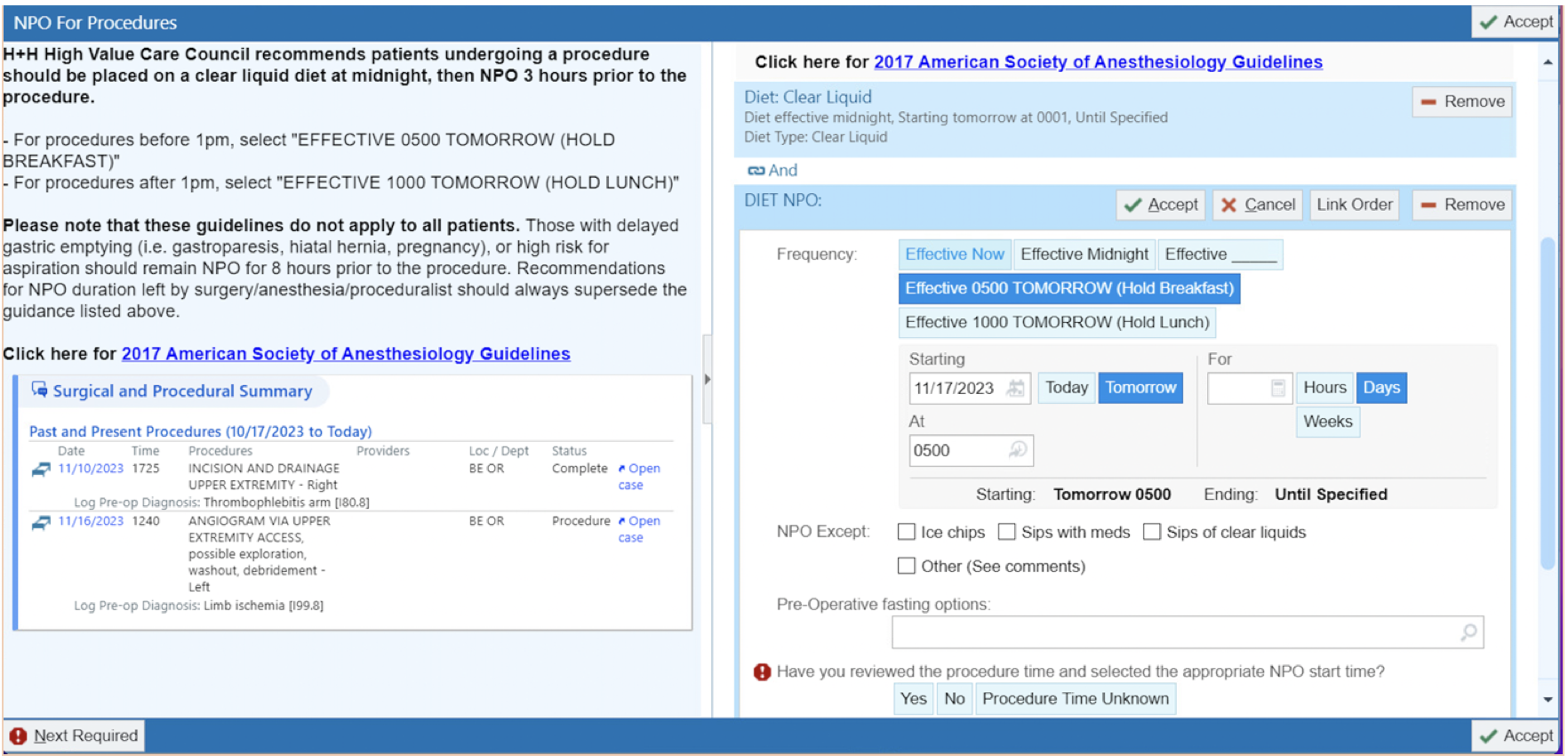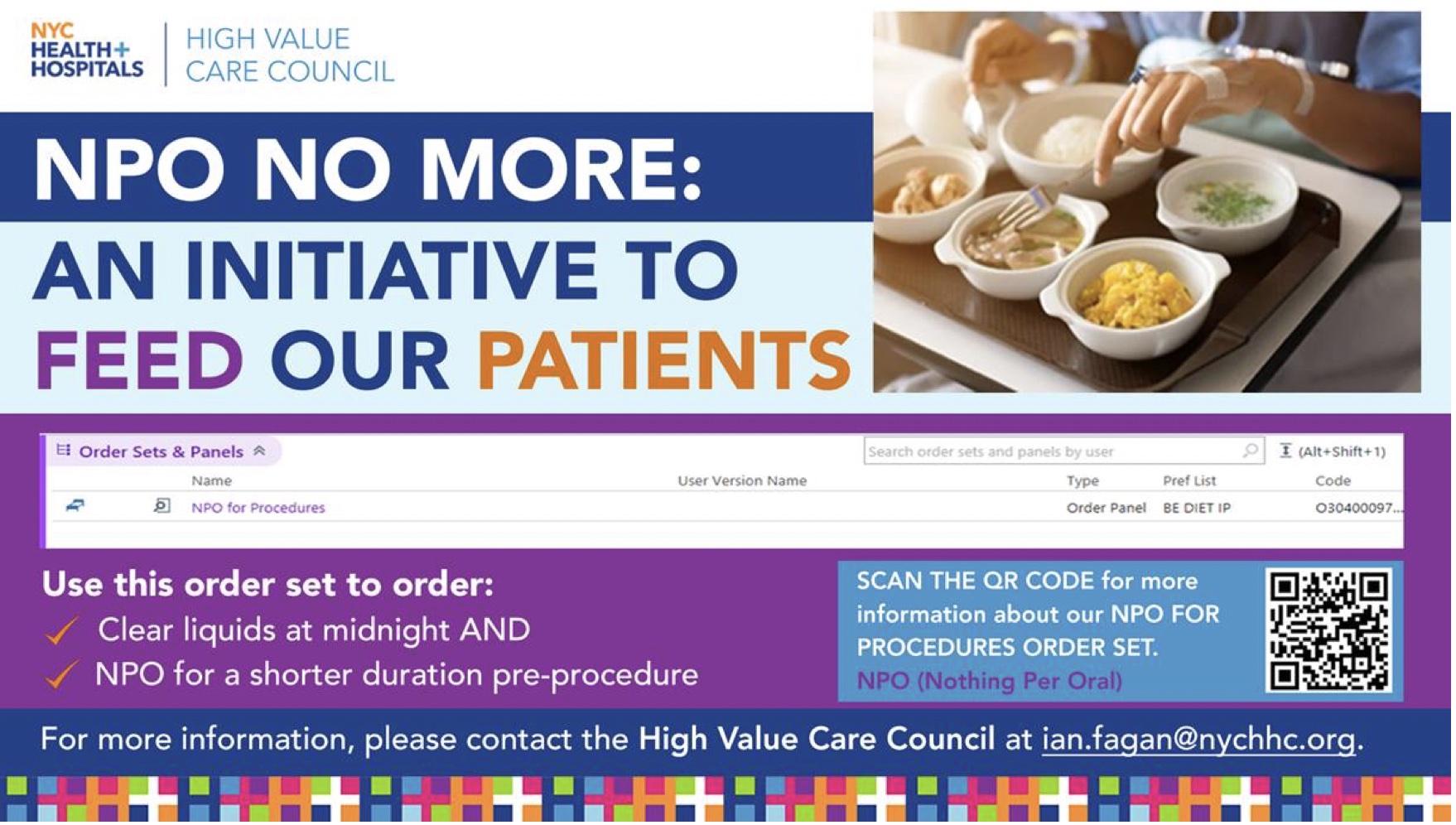Background: In the pre-operative setting, hospitalized patients are often made “NPO” after midnight prior to their procedure. This practice stems from concerns about aspiration of stomach contents intra-operatively, though many studies have established that fluid intake preoperatively does not increase aspiration or other adverse outcomes (1-10). Preoperative fasting has, however, been associated with adverse outcomes including anxiety, orthostasis and acute kidney injury (8, 9, 11-13). Based on this data, the American Society of Anesthesiologists (ASA) updated their guidelines to recommend that patients can have a light meal up to 6 hours preoperatively, non-clear liquids up to 4 hours preoperatively, and a clear liquid diet up to 2 hours preoperatively followed by a 2 hour fasting period. While practices likely vary by hospital, several studies have demonstrated that average preoperative fasting times are longer than recommended by guidelines (14-16).
Purpose: Our objective was to create an order set to prompt providers to order guideline-based preoperative diets and reduce unnecessary NPO orders.
Description: The “NPO for Procedures” order set went live at Bellevue Hospital on March 8, 2023 (Figure 1). The order set provides a link to the updated ASA preoperative nutrition guidelines and automatically lists patient’s scheduled procedure times. The order set defaults to initiating a clear liquid diet at midnight, and the provider is prompted to select either “NPO at 5 AM (hold breakfast)” if the procedure time is before 1 PM or “NPO at 10 AM (hold lunch)” if the procedure time is after 1 PM. After the order set went live our team engaged in educational initiatives to raise awareness including putting up informational flyers, creating a desktop screensaver (Figure 2), holding information sessions for Internal Medicine residents, and updating our preoperative assessment note template to reflect appropriate dietary guidelines.We compared preliminary data from a pre-intervention period (January 1st, 2023 – March 7th, 2023) to a post-intervention period (March 8th, 2023 – July 26th, 2023). During the pre-intervention period, 5.9% of NPO orders in hospitalized patients started at either 5 AM or 10 AM whereas during the post-intervention period 12.1% began at 5 AM or 10 AM. This represents a 6.2% absolute increase in 5 or 10 AM NPO orders from the pre-intervention to the post-intervention period, and a 105% relative increase. Stratifying the post-intervention NPO orders by clinical service, medicine providers ordered NPO at 5 AM or 10 AM 23.7% of the time (141 of 590 orders), and the non-medicine services ordered NPO at 5 AM or 10 AM 2.1% of the time (11 of 512 orders). There was also a decrease in average NPO hours per patient from 15.8 hours to 12.9 hours, a relative decrease of 18.3%.
Conclusions: Implementation of a preoperative diet order set which pulls in information regarding procedure time and recommends timing of NPO diet has the potential to reduce unnecessary NPO at midnight orders and decrease the overall time patients remain NPO prior to procedures. Due to both the new order set and our educational initiatives, we observed an increase in the frequency of NPO diets beginning at 5 AM or 10 AM, though our impact appears to have been limited to the medicine service. To have a greater impact on ordering practices in the future, we will intensify efforts to raise interdisciplinary awareness of this order set and to create electronic reminders for providers to use it.


